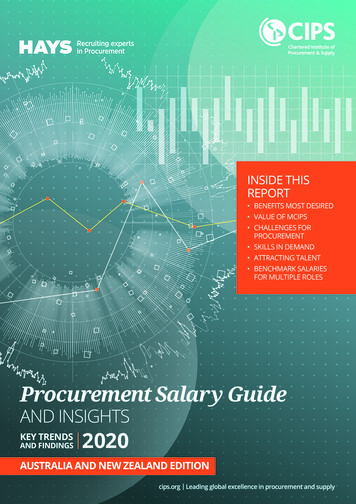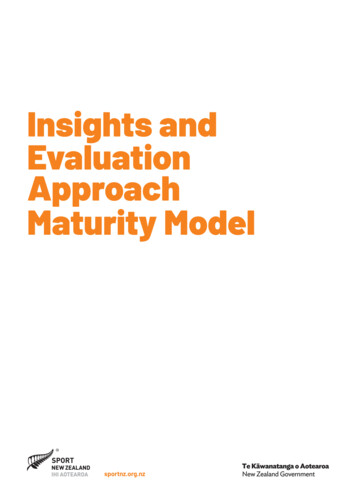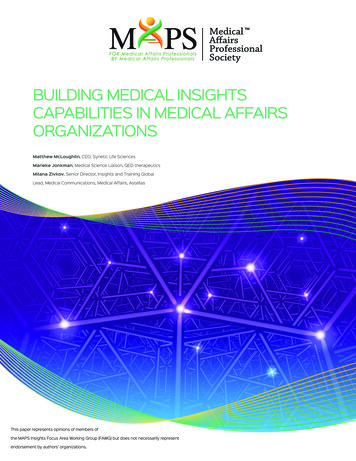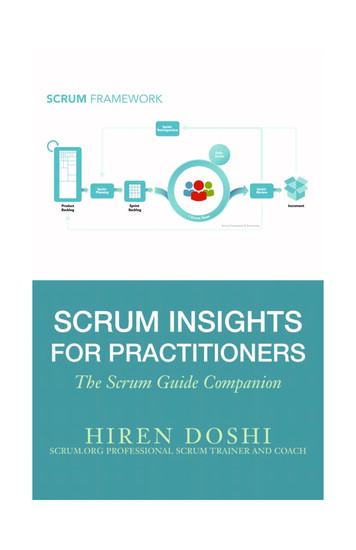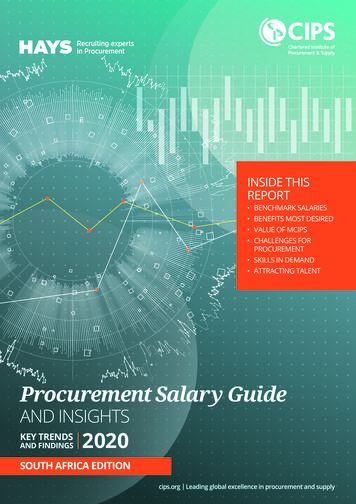
Transcription
INSIDE THISREPORT BENCHMARK SALARIES BENEFITS MOST DESIRED VALUE OF MCIPS CHALLENGES FORPROCUREMENT SKILLS IN DEMAND ATTRACTING TALENTProcurement Salary GuideAND INSIGHTSKEY TRENDSAND FINDINGS2020SOUTH AFRICA EDITION
PROCUREMENT SALARYGUIDE AND INSIGHTS 2020As the latest insights are revealed about the profession, there have been somesuccesses, but we must strive to become even betterAs you’ve picked up this year’s copy of theCIPS/Hays Salary Survey and report, you’vealready demonstrated your commitmentto discovering the value placed not onlyon your skills in procurement and supplychain management, but that of your teamsand peers. I would say there are somecore insights here and a great deal ofprogress has been made in our professionas everyone strives to meet the challengesin the 21st century. Though the data wascollected before the COVID-19 coronaviruspandemic, the results are still absorbing,especially now as supply chain disruptionswreak havoc and professionals are tested toprobably the greatest extent in their careers.Even without the pandemic, supply chainmanagers have had a lot to contend withover the past year. The see saw of will we/won’t we leave the EU, and the US andChina locking horns affecting global trade,gave financial markets the jitters and werejust the tip of the iceberg of trials we allfaced. But as one threat recedes into thebackground, others are always waitingin the wings to take their place as recentexperience has shown us. Ongoing concernsaround how trade negotiations with theEU and the rest of the world will pan out,as well as the human and economic costof the COVID-19 coronavirus are the newnormal. These challenges mean supply chainmanagers are always on their toes; alwayson the lookout for the next threat and howto mitigate against it and always learningabout how to improve their supply chainsand their own skills.cips.org/salary-guide-south-africaPerhaps that’s why the top skill required bybusinesses from procurement and supplychain professionals in the private sectorespecially, was risk management. Riskencompasses many things – continuationof supply is just one, the most basicrequirement, but we know that supply chainmanagers are now responsible for a wholelot more. Sustainability issues, protectionfrom corporate reputational risk, eliminatingslaves from a business’s supply chains, allhave to be the highest examples of notjust risk management but strong ethicalprocurement. As professionals we mustshow greater will, greater transparency,and what I call ethics-plus, to elevate theprofession still further.With this backdrop and with the findings ofthe report, it’s obvious that this professionremains in high demand. When I startedin procurement, there were two goals –continuity of supply and value across thesupply chain. Now procurement and supplychain professionals must protect corporatereputation, create an environment forbest investment opportunities, increaseinnovation, grow the business and beatoff competition, implement digitalisationand the maintenance of sustainable supplychains. That sounds like a lot, and thenecessary range of skills both technicaland soft skills that are required create theprofessionals of choice eagerly sought bybusinesses large and small, and develops ourprofessionals into potentially, the CEOs ofthe future.This year’s report found that 67% ofprofessionals said procurement was valuedat their organisation. Though a positivestatistic, I would like it to be higher. Havingthe right people in the right roles is crucialto the success of every business and wemust be more vocal about the benefits ofprocurement and what as professionals wecan do to support business goals.On a personal career level, procurementand supply chain managers also excel. Withan average pay rise of 6.9%, the rewardsare there for driven individuals. With55% more for MCIPS professionals, thismeans that talent is also being recognised.Therefore, I would urge all our professionalsto keep striving and keep training andmaintain their up-to-date knowledge tobecome Chartered professionals andprove those rewards are well-deserved. Bydemonstrating their relevance not only totheir peers, the businesses they work for,and even the profession itself, the impactfrom highly-skilled professionals will be feltfar and wide. Potentially, and collectively,we can make a difference to economiesand even the public good; by being the bestprofessionals, with the strongest ethics andbringing transparency and excellence tosupply chains.Malcolm HarrisonGroup CEOChartered Institute ofProcurement & Supply
HIRING FOR THE FUTUREWe are pleased to partner with CIPS for a sixth year to continue to provide insight into the keytrends and issues impacting the procurement and supply chain profession.The events of the opening few months of2020 have been unprecedented leaving manyprofessionals and organisations to adapt to anew way of working and to rapidly changingsituations. One thing the COVID-19 crisishas allowed procurement and supply chainteams to demonstrate is just how invaluabletheir role is in keeping vital services acrossthe world afloat, including healthcare, socialcare and food supply chains to name just afew. As we enter into the new era of work, thisimportance will continue to develop.will be in the best position as we transitionto the other side of the pandemic. In termsof the skills in demand, change managementhas entered the list of top skills needed fora professional to perform their job well forthe first time this year. As has been madeapparent in the first few months of 2020,change is inevitable, so being adaptable tochange will likely become even more soughtafter within procurement. Professionalsshould therefore develop in this area tosucceed in the new world of work.In our ‘new normal’ world it’s been shownthat hiring and onboarding procurementprofessionals can continue in a virtual way, sowith skills shortages still being widespread,those employers who are carrying on withtheir recruitment plans to fill skills gaps nowWorking from home is one aspect ofworking life that has become decidedly morewidespread as a result of the COVID-19pandemic. Our guide shows that being ableto work from home is an important factor toprofessionals, so employers should use thisThis report is published as the South Africaneconomy recovers from the impact of thecoronavirus pandemic. The pandemichighlighted the risks that exist in the supplychains of all organisations. Managing that riskhas, arguably, never been more important,while the complexity of the task faced byprocurement professionals has never beengreater.must now start to examine in greater depth;with a view to understanding why the gapexists and what can be done to eradicate it.With this emerging context, the CIPS/HaysProcurement Salary Guide and Insights 2020report clearly shows that in South Africademand for procurement professionalscontinues to be very strong. Within theprofession there continues to be a substantialsalary premium (55%) for MCIPS professionalsas opposed to non-MCIPS professionals.Unfortunately, the gender pay gap dividecontinues to be an issue. This disparity inmale and female earnings been discussed inprevious reports and is one that the professionDigitalisation increasingly allows moreoperational and repetitive procurementtasks to be completed with greater speedand accuracy. This has increased the focus ofprocurement professionals on strategic andrisk management activities. The combinationof the environment in which procurementprofessionals are working and evolvingtechnologies is impacting the skills thatprocurement professionals are being askedto exhibit. There is much greater focus onthe soft skills of communication, relationshipmanagement, influencing and stakeholdermanagement. The development of thesesoft skills will be an increasingly importantcomponent of the future procurementprofessionals’ catalogue of competences. As aresult, the need for training and developmentwill be critical to equip procurementopportunity to see how they can maintainremote working capabilities going forward.The salary increases we are seeing in anumber of roles within the profession is anindicator of the high value that continues tobe placed on talented professionals, and wewould expect this trend to continue in thenext year as the procurement and supplyprofessions continue to play an importantrole during the COVID-19 crisis and beyond.We hope you find the insights covered in thisreport useful in your workforce planning, oras a guide for your own career development.Scott DanceDirector, Hays Procurement &Supply Chainprofessionals with these ‘future facing’competences. This report clearly illustratesthat procurement professionals are aware ofthe need for ‘professional development’. This ismost obviously articulated when employers arerecruiting, with 67% of employers expressinga preference for MCIPS qualified or workingtowards MCIPS when hiring new employees.At the start of this decade the challengefor procurement professionals is clear, arapidly changing business and technologicalenvironment requires new capabilities andcompetencies to be added to the procurementprofessional’s arsenal. The development ofthese capabilities combined with new ways andpatterns of working will be key drivers of theprofession in the next ten years.Dr. John GlenCIPS EconomistVisiting Fellow of Cranfield University 03
ABOUT THIS REPORTThe CIPS/Hays Procurement Salary Guide and Insights2020 allows procurement professionals and employers to: Evaluate the perceptions of procurementBenchmark salaries and bonuses for different rolesHighlight career aspirationsGain insights on how to attract, retain and develop talentThis report is also availablefor the following regions:United KingdomAustralia and New ZealandSub-Saharan AfricaMENANorth AmericaThe data was collected prior to the COVID-19 outbreak, however, we hope the information contained in this guide still provides usefulinsights when hiring or taking the next step in your career during this extremely busy time for procurement professionals. We willcontinue to monitor the impact of COVID-19 in next year’s 2021 report.THE REPORT IS DIVIDEDINTO SECTIONS:1 Procurement – Perceptions,challenges, skills andopportunities2 Salaries, bonuses and benefits3 Talent managementCONCLUSIONCOMPETENCY LEVELAdvanced ProfessionalProfessionalWithin each section we have set out thestatistical findings of our survey alongsideconclusions drawn by the experts involvedin putting together the report, plus linksto useful information and resources thatfurther support the points discussed.The findings in this report are based onresearch conducted in September 2019 via anonline survey among professionals currentlyworking in procurement. This year over 5135professionals globally completed the survey.The results were analysed by the ProfessionalAssociations Research Network (PARN).The data in all graphs is based on 2020respondents only and is not a comparisonon 2019 data. However, we have highlightedsignificant year on year changes.Statistics throughout this report have beenrounded to the nearest decimal point.Throughout this report different levels ofprofessional seniority have beensummarised into five levels of competency.These are described in the chart belowalong with some examples of job rolesthat fall into each group.TYPICAL JOB ROLESHead of Procurement, Procurement Director, Commercial Director,Chief Procurement Officer, Supply Chain Director, Head of Sourcing.Procurement Manager, Purchasing Manager, Senior Category Manager,Supply Chain Manager, Strategic Procurement Manager, Operations Manager,Commercial Manager, Head of Logistics.ManagerialSenior Buyer, Category Manager, Contracts Manager, Contracts Officer,Logistics Manager, Supply Chain Executive.OperationalBuyer, Procurement Specialist, Supply Chain Analyst, Procurement Executive,Procurement Officer, Supply Chain Planner, Logistics Analyst.TacticalPurchasing Assistant, Assistant Buyer, Administrative Assistant, Stock Controller,Contracts Administrator, Inventory Planner, Assistant Contracts Officer.cips.org/salary-guide-south-africa
SOUTH AFRICA94%see technology asan enabler to createopportunities forprocurementThe procurement and supply chain professionhas evolved at an alarming pace and is a moredemanding and rewarding career than it hasever been.Today’s professionals are seen not as buyers, but as enablers,business partners and strategic leaders who understand businessneeds are core to the success of their organisation, and who arealigned with the social responsibility and ethics agenda.The social, political and economic environment in which organisationsare operating is increasing more complex, which has beencompounded by the COVID-19 global pandemic. On top of this,the digital evolution is placing greater demands on procurementand supply chain management. Business leaders are progressivelyturning to procurement for solutions to reduce risks and find newopportunities. In fact, risk mitigation – whether security of supply,reputational risk caused by ethical and environmental issues, orensuring the sustainability of sources of critical products and services –is fast becoming the prime focus of modern procurement.At the heart of this are value, ethics and sustainability, and they shouldrun through everything that procurement does. Procurement andsupply chain professionals need to strategically position themselvesas champions for change, promoting the highest standards of ethicalpractice for their organisations and supply chains. Modern slavery is aperfect example of where professionals, by ensuring more transparentsupply chains, can step in and not only help to safeguard the reputationand longevity of their organisations, but also make a difference topeople’s lives.Procurement is growing ever-more important, valued, interestingand rewarding as a career. And so, it is perhaps no surprise that weare seeing an influx of new talent into the profession. In fact, 66% ofour respondents – a much higher proportion than expected – statedthat they had made a conscious decision to work in procurement andthat’s a different scenario from years gone by when professionals ‘fell’into procurement. It is a particularly exciting career choice for youngprofessionals who are attracted by: the potential to hit the groundrunning from day one, the prospect of managing large budgets, andopportunities to choose and manage supplier contracts that canmake a real difference to people’s lives, and society and economiesas a whole.It has also become easier to move from other professions intoprocurement roles, as organisations continue to place a strongeremphasis on recruiting for soft skills. Technical skills and qualificationsare an important foundation to procurement roles, but they canbe learned and so abilities such as communication, influencing andinternal stakeholder management have become more highly soughtafter. As procurement and supply chain managers develop their skills,we are also seeing more individuals move into more generalist rolessuch as becoming CEOs.In the fourth Industrial Age with its core focus on digital initiatives,we are starting to see more automation of procurement processes,which will continue to evolve: 71% of our respondents see technologyreplacing some or all of their tactical sourcing decisions in the future.This is not a negative as 94% of our respondents see technology as anenabler to create opportunities for procurement. Automation helpsto reduce or even remove human error, and means that soft skills willbecome even more critical and that procurement professionals will befreed from repetitive, time-intensive tasks and able to focus on morebusiness-critical activities such as strategic decision making.The picture our report paints of the value placed on strongprocurement and supply management is largely positive but thereare still some challenges. In the main, these centre on internal issuessuch as not being seen as a business partner and not being engagedand able to input ideas from the start of a project. In reality, gainingcompetitive advantage through appropriate sourcing, efficienciesand effective risk management are real value-adding activities, and sobusiness leaders are increasingly seeking procurement professionalswho are able to deliver these outcomes and enhance their business.Hemant HarriellGeneral Manager, CIPS South AfricaAs the value of procurement continues to grow, itis up to professionals to ensure they are upskillingnot only in technical skills, but also in soft skills suchas communication, stakeholder management andstrategic thinking. Professionals must be developingthese skills no matter what their seniority in order totruly drive value within their organisation.Scott DanceDirector, Hays Procurement & Supply ChainCIPS Tipsfile-spreadsheet Report: Digitalisation in Procurementbinoculars Guidance: Soft Skillsbinoculars Guidance: Stakeholder Management 05
HOWPROCUREMENTIS VIEWEDHOW PROCUREMENT IS VIEWEDPerception of procurement hasimproved in the last 12 months68%Procurement is very muchvalued within my organisation68%AGREE THEPERCEPTION OFPROCUREMENTHAS IMPROVEDin thelast 12monthsProcurement has evolved to a large extentover the last two decades to become morecentral to the success of organisations. Today’sprofessionals have a wider remit, require broaderskills and experiences, and are becoming evermore sought after as challenges increase innumber and complexity. This has never beenmore true than during the COVID-19 outbreak,where procurement professionals have played akey role in helping to keep frontline services, fromhealthcare through to supermarkets, suppliedwith the assets they need to support the country.There is no doubt that procurement and supplychain professionals are making a real differencefor customers, colleagues, society and otherstakeholders.This year’s perception of procurement and supplymanagement is lower than the previous year by10%, where only 67% of respondents agreed thatthe profession is valued within their organisation.This highlights that there is still crucial work to doin terms of influencing key internal stakeholdersand senior leaders if procurement is to becomeeven more highly-regarded and a greatercontributor to business success.67%Directors and Heads of otherdepartments in my organisationunderstand what procurementspecialists can offerProcurement is engaged fromthe start of a projectStaff in other departments inmy organisation understandwhat procurementspecialists can offer62%51%48%It is encouraging to see that most respondents continueto agree that the procurement profession is valued withintheir organisation. However, there is still work that canbe done to further improve the understanding of otherstaff, including senior stakeholders, about the value thatprocurement specialists can offer. Developing stronginternal stakeholder management and communicationskills is essential. Focus on understanding the pressurepoints of each of your internal stakeholders and use thisknowledge to communicate how procurement can help toalleviate these challenges.Scott DanceDirector, Hays Procurement & Supply ChainmicrophoneCIPS TipsPodcast: Behavioural Procurementnewspaper Guide: How to become an effective storytellerbinoculars Guidance: Change guide-south-africaPodcast: Procurement must lead rather than being ledTools: Soft Skills and Communication ToolsTools: Stakeholder Identification and Management Tools
KEYCHALLENGESExcluding the impacts of COVID-19 onorganisations, our findings show thatonce again, internal challenges dominatethe findings of the report, reinforcingthe importance of securing strategic andoperational buy-in and engagement withstakeholders as a priority for professionals.Procurement must be championed as astrategic enabler at the very highest levelsof an organisation and be fully appraisedof strategic objectives to deliver againstthe senior leadership’s expectations,demonstrating real value.47%STATEDBEING SEENAS A STRATEGICPARTNER TO THEBUSINESSas thetopchallengeIn organisations where procurement isseen as a strategic function, the professionis likely to be engaged at the earlieststages of identifying business goals, suchas supply chain sustainability, cost savingsand digitalisation. Many organisationsare coming to realise that to play a partin achieving these corporate goals,procurement must be involved at thebeginning.Managing risk in the supply chain is alsoidentified as a key challenge and is evenmore important to master in the challengingenvironment brought about by theCOVID-19 outbreak. Every procurementprofessional must ensure that they arefully informed of exactly what is happeningthroughout their supply chains in order tominimise operational and reputational risk,and keep up to date with developments.Furthermore, procurement professionalsneed to strategically position themselvesas champions and leaders for change,promoting the highest standards of ethicalpractice for their organisations and supplychains rather than playing catch up aschange occurs.TOP SIX CHALLENGESBeing seen as a strategic partner to the business47%Managing risk in supply chain42%Being recognised within the organisation for savings made37%Budget restraints37%Managing costs while maintaining qualityAttracting staff with the right skillstoolboxtoolbox36%34%CIPS TipsTool: CIPS Risk ToolkitTool: CIPS Risk and Resilience Assessment ModelbinocularsGuidance: Risk Analysis and ManagementwebcamWebinar: How can AI support risk management? 07
THE GLOBAL OUTLOOKMCIPS SALARYDIFFERENTIAL%17%8%Soft skills are in demand at every level ofthe procurement profession, but are mostpronounced at senior levels.5%It is those skills like negotiation and communication,influencing and stakeholder management that help toelevate the value of procurement within a business andwhich are essential to building relationships. Technicalexpertise is obviously an essential requirement, howeveremployers need to consider a shift in recruitmentstrategies to ensure that soft skills are factored in too.UKNORTH AMERICASKILL MOSTIN DEMAND –62%CommunicationBiggest challenge for the region50%Being seen as astrategic partner50%Managing risk inthe supply chaincips.org/salary-guide-south-africaSKILL MOSTIN DEMAND –COMMUNICATION69%NegotiationBiggest challenge for the region56%Being seen as astrategic partnerMENASUB-SAHARAN AFRICASKILL MOSTIN DEMAND –68%NegotiationCOMMUNICATIONBiggest challenge for the region45%Managing risk inthe supply chainSKILL MOSTIN DEMAND –63%CommunicationCOMMUNICATIONBiggest challenge for the region45%Budgetrestraints
93%GLOBALLY, ANAVERAGE OF 93% SEETECHNOLOGY AS ANENABLER TO CREATEOPPORTUNITIES FORPROCUREMENTThe digital revolution is placing morecomplex demands on procurement andsupply chain management. It is thereforelogical that procurement professionalsview technology as a critical enabler ofopportunities for the future.46%31%55%22%SOUTH AFRICASKILL MOSTIN DEMAND –AUSTRALIA63%SourcingCOMMUNICATIONBiggest challenge for the region47%Being seen as astrategic partnerSKILL MOSTIN DEMAND –NEW ZEALAND68%CommunicationCOMMUNICATIONBiggest challenge for the region65%Being seen as astrategic partnerSKILL MOSTIN DEMAND –68%CommunicationCOMMUNICATIONBiggest challenge for the region65%Being seen as astrategic partnertoolboxCIPS TipsTool: View theglobal interactivemap for the fullbreakdownfor each region 09
IMPORTANCEOF KEY SKILLSTOP FIVE SKILLS IN DEMAND BY JOB LEVELKEYSoft skillsTechnical skills ADVANCED PROFESSIONALLeadershipNEGOTIATIONAND SUPPLIERRELATIONSHIPMANAGEMENTIMPORTANT ATALL LEVELS91%Negotiation81%Supplier Relationship Management78%Contract Management75%Supplier Evaluation and Appraisal75%PROFESSIONALThe perception of procurement in the region needs tobe enhanced to be seen as a more strategic activity anda critical part of achieving organisational objectives. Aswe have highlighted earlier in this report, this means thedemands on today’s procurement professionals are morecomplex and have increased in number. This brings bothopportunities and challenges for procurement and supplychain managers if they are plugged into the latest thinking,and while technical skills are well understood, the skills fortoday’s successful procurement professionals have muchin common with those of a business leader.Soft skills continue to grow in importance at every levelglobally this year, and are seen as very important byprocurement professionals for doing their jobs well.This year, communication and supplier relationshipmanagement were identified within the top five skillsin demand at all levels except Advanced Professional,while leadership was also of importance for seniorprofessionals. These skills are all critical to achievingcost-effective strategically sound procurement solutionsand raising the profile of the profession within theirorganisations. Trained professionals know this includescreating a business case, securing buy-in from internalstakeholders, pre-empting challenges and sourcing theright suppliers.Of course, technical skills are still valued and so wecontinue to see emphasis on negotiation and contractmanagement. This year, change management skillsare increasing in importance. Traditionally, dealingwith change was tasked to a tactical function but moreand more, organisations appreciate the limitations ofthis approach which may stem from lack of skill andexperience, lack of time to implement change or notenough information available for the programme.Business leaders therefore see change management asa distinct and strategic skill which requires departmentaland senior level buy-in, the right support and the rightsystems in place. However, as well as requiring technicalknowledge, effective change managers must also possessall the soft skills listed here and so this cannot be seen asstandalone ship83%Communication83%Contract Management81%Supplier Relationship %Communication82%Supplier Evaluation and Appraisal79%Supplier Relationship Management79%Contract Management79%OPERATIONALNegotiation88%Supplier Relationship Management82%Supplier Evaluation and munication77%Supplier Relationship Management60%Negotiation54%Supplier Evaluation and Appraisal54%Sourcingwebcam50%CIPS TipsWebinar: Influencing the C-Suitebook-reader Top 10 tips for influencing internal stakeholderstoolbox Tool: CIPS Global StandardmicrophonemicrophonePodcast: Procurement must enhance their soft skills toincrease their influencePodcast: Procurement must lead instead of being led
SALARIES SOUTH AFRICASALARY BY LEVEL OF SENIORITYAverage 2020 ADVANCED PROFESSIONALR IONALPAY RISEinSouthAfricaR 829,010MANAGERIALR 699,985OPERATIONALR 420,236ZAR577,773Average salary for allprocurement andsupply professionalsThe average pay rise for procurementprofessionals this year is 6.9%, painting a verypositive picture for procurement; of a professionthat is highly regarded and remunerated. Only40% of our respondents stated that there was atransparent pay grade in their organisation and,as expected, those at more advanced levels ofseniority earn higher salaries. Remuneration ishighest in the Private Sector, as are the highestpay rises at 7%. However, the highest incidence ofthose receiving a pay rise was in the Public Sectorat 86%, perhaps a sign that this sector is seekingto win talent from the Private Sector.Our report highlights a significant gender paygap of 38% and so it is clear that organisationsin South Africa have much work to do in orderto face up to and proactively address this issue.For men and women alike, salary is the mostimportant issue when considering moving to anew employer and so in order to retain talentedwomen in the profession gender pay equalitymust be addressed.However, although salary will always be animportant aspect for employers to get rightto attract professionals to a role, it should notbe viewed in isolation. Not every organisationwill be able to compete for talent through pay,and therefore the entire package on offer toprofessionals, from benefits and flexible workingoptions through to the variety of the role, mustalso be considered and promoted to prospectivejob candidates.TACTICALR 275,616Male v Female averagesalary differenceAVERAGE SALARIES BY GENDERR 677,568MaleFemaleR 491,492 186k 38%INCIDENCE OF RECEIVING A PAY RISE BY SECTORPublic Sector80%Private SectorCharity/Not for Profit86%43%Employers should benchmark their salaries to ensure theyare as competitive as possible to attract talent. Further to thisis the consideration of what else your organisation can offerto a prospective employee. For example, can your employeeswork from home? Are you able to offer support for trainingsuch as through CIPS? Is the job very varied? Promoting thisinformation to prospective candidates alongside salary canhelp your organisation to stand out from the competition.Scott DanceDirector, Hays Procurement & Supply ChainwebcamCIPS TipsTool: Interactive global salary map 11
PROFESSIONALRECOGNITION55%SOUTHAFRICA AVERAGESALARY DISPARITYACROSS ALLLEVELSMCIPSv nonMCIPSMCIPS SALARY DISPARITYZAR 987,857 ZAR 636,292 MCIPSWe continue to see a growing globalappreciation and understanding of the valueof MCIPS and FCIPS as procurement growsits strategic influence. The designations areclearly highly respected and valued as amark of professionalism and performance.MCIPS denotes that an individual hasachieved an internationally recognisedaward which represents the global standardwithin the profession for a procurementprofessional. It signals to peers andemployers professional excellence based onability, achievement and ethics. Combinedwith ambition and commitment, MCIPSpro
PROCUREMENT SALARY GUIDE AND INSIGHTS 2020 As the latest insights are revealed about the profession, there have been some successes, but we must strive to become even better As you've picked up this year's copy of the CIPS/Hays Salary Survey and report, you've already demonstrated your commitment to discovering the value placed not only .



